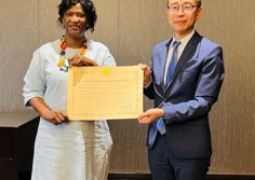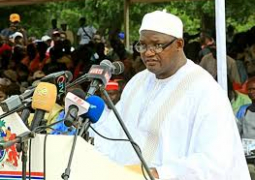The report, adopted on Tuesday, focuses on the Regional Soil Fertility Mapping Project (GMB-1033) to be financed by the IsDB to the tune of US$ 1million.
The Chairman of the Committee, Omar Darboe, who is Member for Upper Niumi Constituency, upon reading the report, stated that “the loan is concessionary” with a grace period of 7 years and repayment period of 30 years.
He also highlighted the benefits of the project, saying: “The project provides for the very first time a digitized soil fertility map of the whole country, provides two State-of-the-art spectral soil laboratories: one at NARI and one at the Soil and Water Management Unit of the Department of Agriculture that will be able to carry out all soil nutrient and physical analysis without the use of chemical reagents.”
The project, he continued: “Builds the technical capacity of NARI and the Soil and Water Management Unit of the Department of Agriculture (DoA) to be able to carry out effective nutrient omission trials and laboratory soil analysis even after the expiry of the project. NARI under the technical guidance of some of the technical partners involved in this project will be able to do a site-specific fertilizer recommendation for all the major crops of the country.”
Further reading the report, he said the last time The Gambia carried out a countrywide soil fertility mapping was in 1980.
“With the changes in soil dynamics, this information is obsolete and not useful now,” he stated, saying: “Many potential investors have been scared away from investing into commercial crop production because they could not find reliable information on the nutrient status and quality of the soils of the areas they wanted to invest in.
“The public institutions, university students and private individuals all take soil samples across the border to Senegal for testing, which is very expensive, and the results could be compromised if the samples are not well-handled during transportation. It is based on these and many other reasons that the Ministry of Agriculture deems it necessary to carry out a comprehensive soil fertility mapping for the whole country.”
“Soil fertility maps have now become an investment requirement for crop production-related investments by both the private and public sectors. It is a way of assessing soil nutrients on the basis of soil sample test results and preparation of soil fertility map at the required scale.”
The committee recommended that the project should be implemented by personnel serving in an existing institution within the Ministry of Agriculture without him or her leaving the position he or she is occupying in the institution.
Also, he intimated, one of the labs should be built in Sapu in CRR South. “After the establishment of the labs, essential parts of the machines should be made available for sustainability purpose,” he posited. “A four-year warranty should be provided for all the equipment (Spectral Labs) supplied to the project.”



